What’s the difference in an enzyme vs probiotic?
Both of these words are common in the gut-healing space, but what do they actually do?
It’s all coming up today on Episode 75, Bites #20 of the A Gutsy Girl podcast.
Subscribe Today:
Apple Podcasts | Spotify | iHeart Radio | RSS
Resources
- Break Down (If you want to try Break Down, simply go to guthealingsupplements.com and at checkout enter code AGUTSYGIRL to save 15% off your first order.)
- Just Thrive Health Probiotic (If you want to try this probiotic, simply to go justthrivehealth.com and at checkout enter code AGUTSYGIRL to save 15%.)
- Nutrient Absorption
- Episode 9 of the podcast with Kiran Krishnan
- Probiotic Strains vs Species
- All About Just Thrive Probiotic
- 8 Probiotic Myths
- The Gutsy Bundle (now includes Break Down!)
- Get your gut healing journal
- A Gutsy Girl’s Bible
- A Gutsy Girl supplement line, guthealingsupplements.com
Don’t Miss These Thoughts
- What is a digestive enzyme?
- What are probiotics?
- Foods with natural enzymes
- Foods with natural probiotics
- How to supplement with digestive enzymes and/or probiotics
Enzyme vs Probiotic
Click HERE to save this post for later.
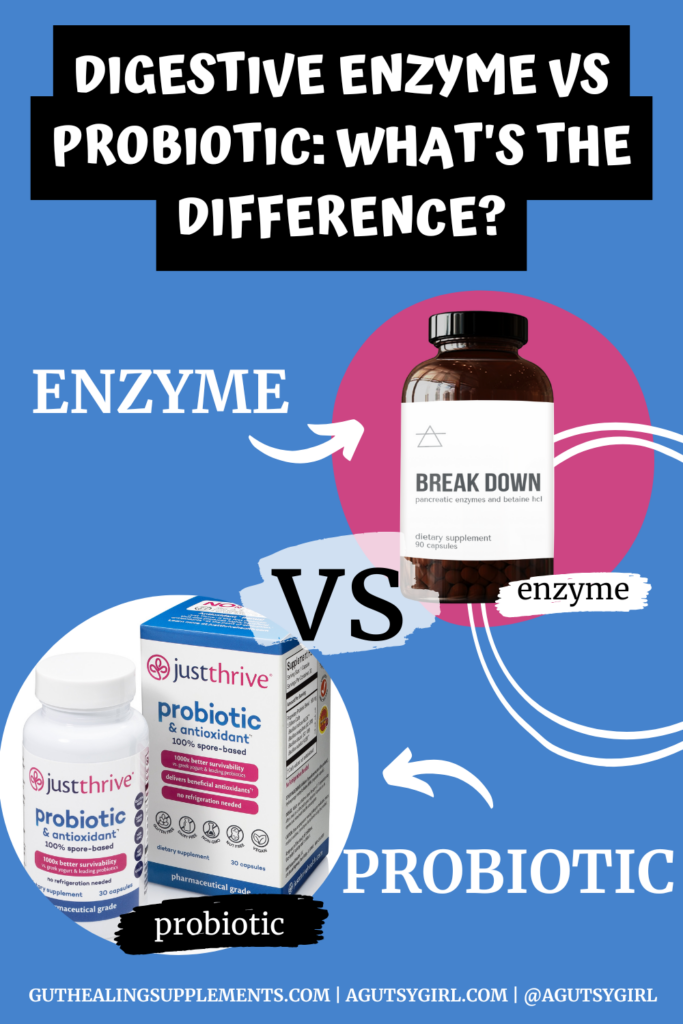
Each of these supplements supports the gut microbiome differently and it is important to know their specific functions for optimal digestion.
Having proper knowledge of the supplements you use is key to your gut journey and can help you reclaim your health.
So on to the first topic.
What is a Digestive Enzyme?
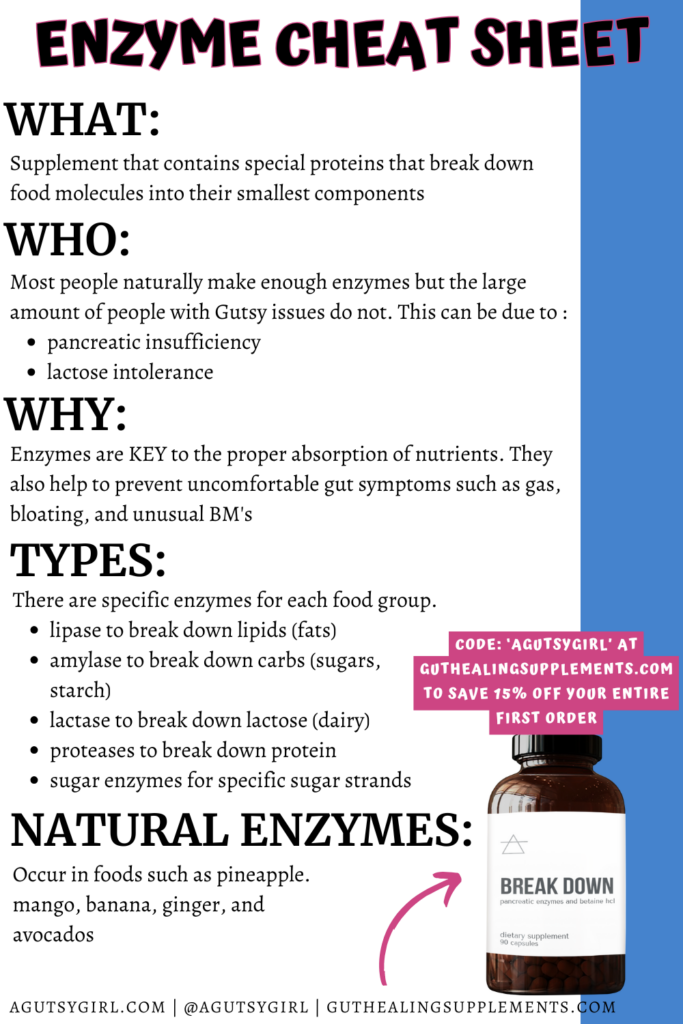
A digestive enzyme is a supplement that contains special proteins, called enzymes, that break down food molecules in the digestive tract.
These enzymes break food particles into smaller molecules so they can be absorbed by the small intestine and sent to the body for various uses such as energy or storage.
Each specific enzyme targets a different food group.
Here are some of the most common ones:
- lipase to break down lipids (or fats)
- amylase to break down carbs (grains, fruits, vegetables)
- lactase to break down lactose (dairy products- hence where “lactose intolerance comes from”)
- proteases to break down protein
- sugar enzymes such as maltase and sucrase that break down specific sugars + carbohydrates
There are even more specific enzymes that break down other components of food, but these are the main ones you find in most enzyme supplements.
Most supplements will combine all of these specific enzymes into one formula so that your body has extra help in breaking down the food that you eat.
Who Needs Digestive Enzymes?
Most people with any sort of GI issues could benefit from enzymes.
Enzyme deficiency is extremely common in the Gutsy community and can occur due to a number of health conditions.
Pancreatic insufficiency is a common root issue of “IBS” and other gut issues, which means the body is not able to produce the necessary enzymes needed to break down food.
This lack of digestive enzymes builds up food molecules that ferment in the gut and create uncomfortable digestive issues.
Another common enzymatic insufficiency is lactose intolerance, where the body fails to produce necessary levels of the enzyme lactase.
This can create food intolerances regarding anything with dairy in it. Oftentimes, these individuals are advised to either avoid dairy or take a specific lactase-containing supplement.
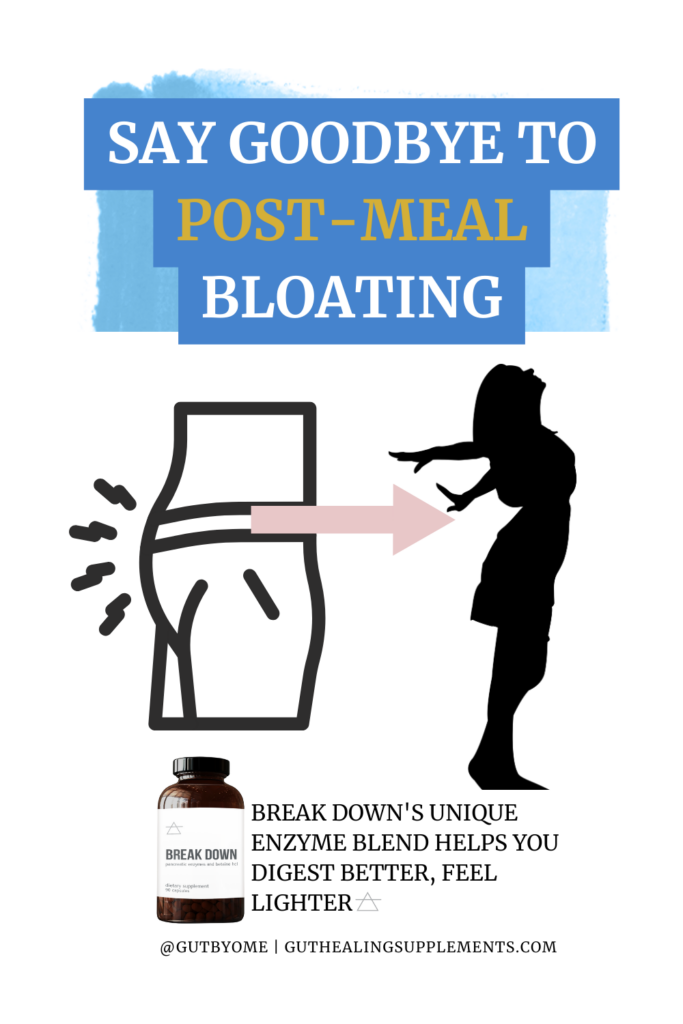
Foods Containing Natural Enzymes
If you prefer to go the completely natural route first, then you can try different foods that are known to contain high levels of enzymes.
Pineapple
Pineapples contain the enzyme bromelain, which is a protease and helps to break protein molecules down. So if you are eating a meat-heavy meal. consider pairing it with some fresh pineapple.
Papaya
Contains another protease called papain which helps break down protein molecules into amino acids (their smallest parts).
Mango
These fruits contain specific amylases that help break down carbohydrates or simple sugar chains.
Honey
On top of anti-parasitic and anti-bacterial properties, honey also has enzymes that help to break down starch, sugars, and proteins.
Raw honey is the most enzyme-rich due to the little processing that has occurred to produce it. It contains a lot of enzymes so adding a bit to any meal could be extremely beneficial for your digestive system.
Avocados
These are high in lipase, which is critical for digesting fat. This is super convenient as avocados themselves are extremely high in healthy lipids. They practically are designed to help your body digest them. How cool is that?
Ginger
Ginger is a popular addition to any gut healing journey, as it helps with consistent bowel movements and promotes healthy movement throughout the digestive tract.
It also contains zingibain, a protease that helps to break down proteins.
Bananas
Bananas have both amylase and glucosidase enzymes which break down carbohydrates into smaller sugar chains.
By incorporating any of these probiotic foods into your meals, you may see some improvement in digestive function due to the better breakdown of food.
This helps to promote a less irritated gastrointestinal tract as well as promote healthy levels of nutrient absorption.
Source: HERE

What are Probiotics?
Probiotics are active cultures of bacteria that can colonize in your gut.
This helps to reestablish healthy levels of bacteria within your small intestine and large intestine, which can be a game-changer for your overall health.
A healthy gut microbiome (the collection of bacteria, yeasts, and other microbes) help not only to digest food, but also to manufacture vitamins, prevent harmful pathogens, regulate immune health and connect to mood.
The integrity of your gut plays a key role in ensuring the rest of your body is functioning at its optimal position.
Some other functions of healthy bacteria in the gut include:
- ensuring health of gut barrier
- regulating enzyme action
- creation of cytokines (key player in immune system)
- functioning of nervous and endocrine systems
- creation of fatty acids
Most probiotics contain different levels of Lactobacillus, Bifidobacterium, Saccharomyces, Streptococcus, Enterococcus, Escherichia, and Bacillus.
These can be extremely helpful in individuals with irritable bowel syndrome who suffer from bacterial dysbiosis.
This means that the “bad” bacteria have overrun the “good” bacteria and the gut is no longer in its optimal state.
Probiotics can help to regrow friendly bacteria colonies that push out the bad bacteria.
Source: HERE
Probiotic-Rich Foods
On top of probiotic supplements, some foods naturally contain a high level of good bacteria.
This has the same action in your gut as taking a probiotic supplement would.
Kefir
Kefir is a milk product that has been fermented to let certain bacterial colonies further grow. It not only has high levels of bacteria but also has several enzymes such as lactase that help to digest its milk sugars.
It also contains yeast that can help with fungal overgrowth (SIFO).
Yogurt
Yogurt is one of the most popular sources of probiotics as it can easily be added to most meals.
It is mainly composed of lactic acid and bifidobacteria. Be careful and ensure that your yogurt does contain live cultures if looking for a probiotic source.
Some brands kill off the bacteria due to high levels of processing.
Sauerkraut
Sauerkraut is a byproduct of cabbage that is composed of primarily lactic acid bacteria. It also contains high levels of vitamin K, vitamin C, and sodium.
It also contains multiple antioxidants that have been directly linked with optic health.
Tempeh
Tempeh is a popular plant-based protein made up of soybeans.
In addition to its probiotic content, it also contains vitamin B12, a vitamin that is usually only seen in animal-based protein.
Kimchi
Kimchi is a cabbage based meal that contains lactic acid probiotics as well as vitamin K, vitamin B, and high levels of iron.
Kombucha
Kombucha is a drink often made from fermenting bacteria and yeasts. It has very high levels of probiotics and yeasts that can help with the creation of a healthy gut microbiome.
Notice how most of these foods are fermented? That is entirely intentional.
Fermented foods consist of a process that feeds the bacteria in foods with sugars that help colonize bacteria and other microbes. This process often results in a bitter-tasting product, that is delicious paired with most meals.
Source: HERE
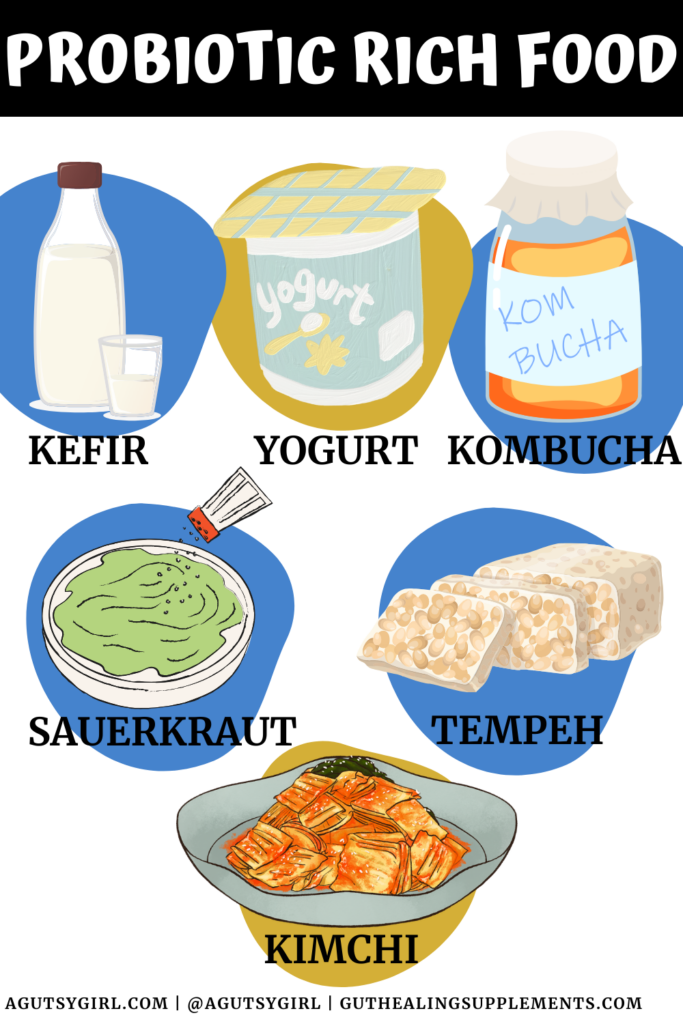
Digestive Enzyme Supplements
As with most supplements, it is important to purchase high-level brands that are as clean and reliable as possible.
Since I started my gut health journey, I have experimented with several different supplements. Because of this, I am confident about which supplements + supplement ingredients I personally believe to be superior and effective.
So of course when I launched my own supplement line (over a decade later), I included a Digestive Enzyme; it’s called Break Down (because remember, that’s what a digestive enzyme is intended to do — break your food down so that you can have better digestion.)
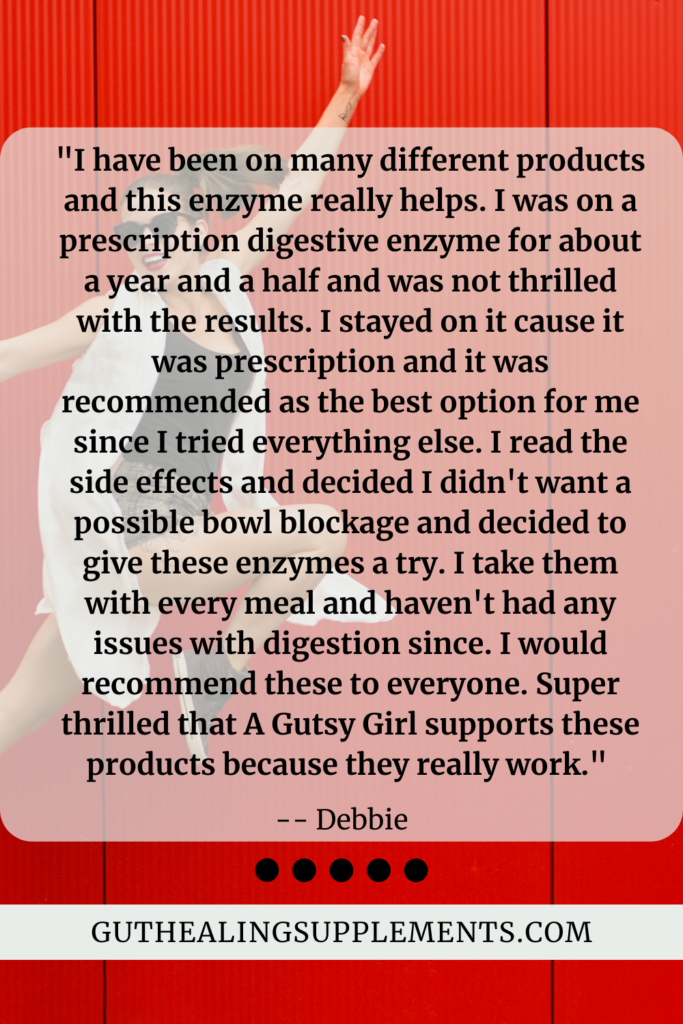
Break Down (aiding in the digestive process)
If you struggle with gas, bloating, constipation or feeling full after only a small meal, Break Down is the perfect choice for you.
Poor digestive function can impede the absorption of essential nutrients from your diet, and several factors like aging, stress, digestive disorders, medications and others can impact the secretion of stomach acid, pancreatic enzymes, and bile.
This is where Break Down comes in, providing betaine HCl for supporting proper stomach acidity, lipases, proteases, amylases, lactase, glucoamylase and ox bile extract to aid in the digestion of fats, proteins, carbohydrates, lactose and fat-soluble vitamins.
This product will help you unlock the full potential of the nutrients in your diet and lead a healthier life.
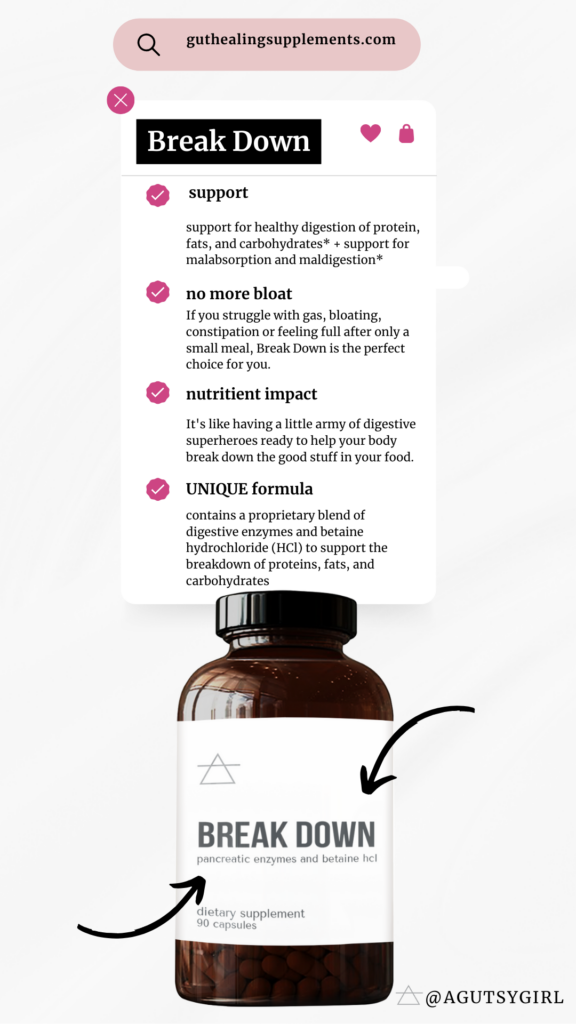
Get this practitioner-grade supplement today! Try it and use code AGUTSYGIRL at checkout to save 15% off your entire first order.
If you want to explore other digestive enzyme supplements, here are 4 more to consider:
- DigestPlus by Enzymedica- basic enzyme formula
- SpectraZyme Complete– stronger enzymes
- Digestive Enzymes Ultra by Pure Encapsulations- basic enzyme formula
- TruFlora by Master Supplements- combination of enzymes and probiotics
Probiotic Supplements
There are SO many probiotic supplements out there, it can get a bit confusing on which ones to try out.
My personal advice regarding probiotics is to try out which ones make YOU feel the best.
Since everyone has such a unique gut microbiome, different probiotic strains are going to have different outcomes on everyone.
Since there are so many different brands, I am going to give you some advice on choosing a probiotic.
Higher CFUs does NOT mean better
Oftentimes it is touted that the more strong a probiotic is, the better it will work. This is measured by the CFU count on the package, which explains how many colony-forming units there are.
For Gutsy girls especially, it can be helpful to start with a lower dose and work your way up to those stronger ones.
Refrigeration is not a requirement
Some people still firmly believe that if your probiotic does not need to be refrigerated then it is not “real.” This is entirely untrue as most bacteria can thrive at room temperature and often grow the best at these conditions.
Look for those extra ingredients
Unfortunately, as with most supplements, companies will add in fillers and other unnecessary ingredients. This can upset your gut further and cause inflammation, which is the exact opposite of what we are going for.
Try and find products that are as clean as possible and contain little to no added ingredients.
The Just Thrive Probiotic is ‘A Gutsy Girl’s’ probiotic of choice. If you choose to try it, you can use code AGUTSYGIRL at checkout to save 15%.
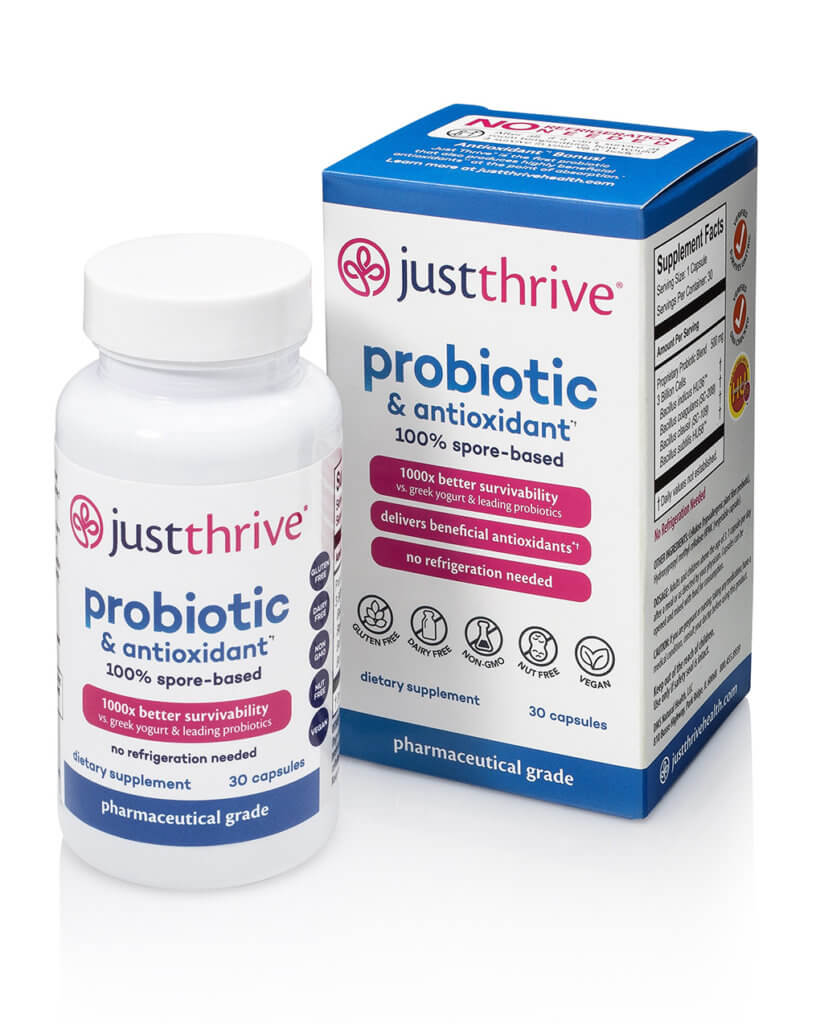
SIBO and Probiotics
It is SO SO important to uncover the root cause of your symptoms before adding any sort of probiotic into your routine.
Individuals with SIBO already have overgrown bacteria in their small intestines, and adding further colonies can continue the overgrowth.
Most practitioners will recommend soil-based probiotics, if any, for those with SIBO as they do not colonize in the small intestine.
Some probiotics will cause worse digestive symptoms for anyone struggling with dysbiosis, so be extra careful.
Digestive Health
Both digestive enzymes and probiotics are common digestive supplements for optimal gut health.
They both get rave reviews (as a whole) because they work.
If you liked this post on enzyme vs probiotic, you might enjoy:
- Betaine HCL (vs. Digestive Enzymes)
- DHA vs EPA {Episode 73, Bites 19}
- 13 Probiotic Benefits Beyond Gut Health
Disclosure: When you purchase via any of the links in this post, I am paid a small affiliate commission. All opinions stated here are 100% my own. I appreciate your support. This compensation helps with expenses to keep the website up and running. And, of course, this allows me to continue sharing all that I can with you. For my full disclaimer and disclosure click HERE. Thank you for your support!
Xox,
SKH
Janie Greene is



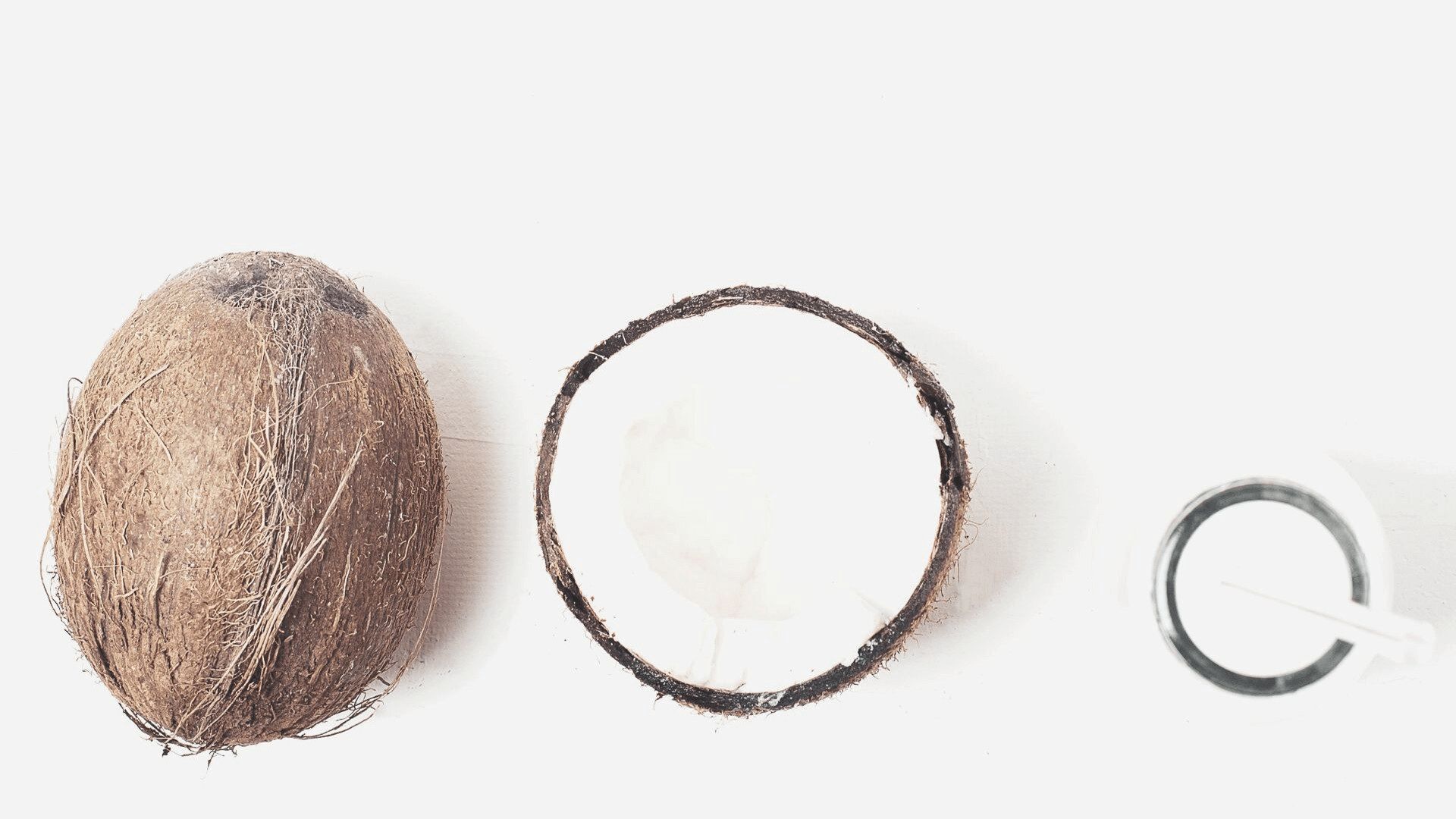
![Q&A 5 with A Gutsy Girl [Episode 29: Colitis, GAPS Diet, Healing Mindset, and more]](https://agutsygirl.com/wp-content/uploads/2022/02/episode-29-podcast-featured-agutsygirl.com_.png)

